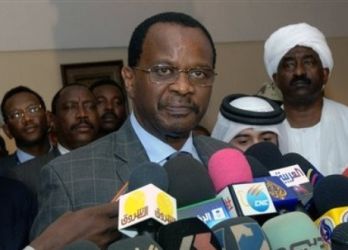New article
April 26, 2012 (LONDON) – The Chairman of Darfur’s Regional Authority, Tijani el-Sissi, said Thursday that $10-13 billion was needed for Sudan’s western region to recover from nine decades of conflict.

Investment in the impoverished region was a key element in the deal signed in Qatar and Sissi repeated his comments from earlier this week to the Sudanese parliament that peace deal would collapse if appropriate finance was not provided for development and peace building projects.
Sissi told the audience in London at the event organised by the Humanitarian Policy Group (HPG) of the Overseas Development Institute (ODI) that other key elements of the deal were being implemented including the establishment of the Darfur Regional Authoruty (DRA) in El Fasher.
He also said that the National Human Rights Commison had been created and had visited Darfur. Sudan’s first vice president, is also now from Darfuri another demand made by the LJM. Al Haj Adam Yousif, a member of the ruling National Congress Party from Darfur was appointed last year but without a constitutional ammendment, so after this term there is no guarantee that someone from Darfur will hold the position.
The former rebel leader said that the DRA had three priorities:
- Allow refugees and internally displaced people to return to their homes, ensuring that land occupied by new comers was returned. A land commission had been established to oversea this,he said.
- Reconstruction and development of Darfur, which estimated could cost $10-13 billion.
- Repairing the social fabric of Darfur and bringing communities together after they had been polarised by the conflict which has caused tribal fault lines between Arab-African and other ethnic divisions.
However, Sissi admitted that there will be security and financial challenges in implementing the DDPD.
He said that the Darfur Development Bank needed to be established so that the state of Qatar and other international donors who had pledged funds could provide the finance that was at the heart of the DPDD.
Without the finance in place, he said. “there is simply no agreement”.
In a briefing to the Sudanese parliament on Tuesday over the implementation of the DDPD Sissi said that Khartoum has not yet paid the 200 million dollars needed as a capital to establish the bank and this had impacted negatively on the DRA’s plans.
The international community pledged over $800 million and Qatar said it will pay spend $2 billion on Darfur development projects through the DDB.
However, Sissi said Tuesday that Sudan’s Finance Ministry”has not paid any penny for the bank. We should be more serious if we want peace in the region,” he said, as the lack of funding led to the postponement of two conferences on reconciliation among Darfurians and the voluntary return of the internally displaced people and the refugees.
Since the independence of South Sudan Khartoum has suffered from a severe economic crisis due to loss of oil revenue.
Khartoum accuses the three Darfur rebel groups who did not sign the DPDD of being backed by the new state on its southern border.
Sudan’s First Vice President Ali Osman Taha has said that the government will refuse to allow South Sudan to export its oil through the north after weeks of fighting over the world’s newest and largely un-demarcated oil-rich border.
Juba stopped oil production in January over a transit fee dispute with Khartoum, accusing the north of taking its oil illegally.
Earlier this month South Sudan’s army (SPLA) occupied Heglig one of the few oil fields remaining in Khartoum’s control after Southern secession in July took with it 75% of production.
Khartoum alleges, and there is some evidence that Darfur rebel group the Justice and Equality Movement took part in the attack.
Sissi desribed the involvement of Darfur rebels in Heglig, which the Sudan Armed Forces wrestled back from the SPLA on 20 April, as a “collosal mistake”.
JEM, the two main factions of the Sudan Liberation Army former last year an alliance with Sudan People’s Liberation Movement – Northern Sector which has fought the government in South Kordofan and Blue Nile since last year.
Before the 2005 peace deal that culminated in South Sudan’s independence the SPLM-N were part of the southern-based rebel that had fought the government for two-decades.
Juba says it no longer supports its former comrades but Khartoum has refused to sign security agreements with South Sudan unless the SPLM admits it continues to back the group.
Supported by the international community, the DDPD is seen by many opposition forces as having the potential to bring peace in the region and end the nine-year conflict in Darfur where over 300,000 have people died according to UN estimations.
However, major rebel groups rejected the deal or did not take part in the Doha process. Since November 2011 Darfur’s three main rebel groups established an alliance with the Sudan People’s Liberation Movement – North aiming to topple the government.
Despite the forming the Sudan Revolutionary Forces coalition, Sissi expressed hope that the non-signatories to the DDPD would join the process. He told the audience in London that a substantial number of people in Darfur supported the Darfur peace process his party has entered into with government.
A previous Darfur Peace Agreement or Abuja deal was signed on 5 May 2006 between the government and a faction of Sudan Liberation Movement led by Minni Minnawi. However, the deal collapsed in 2010 as the parties failed to implement the security arrangements.
Sissi said on Thursday that he hoped that his deal with the government would not suffer the same fate and noted the positive receptive he and his team had received since arriving in Khartoum.
He said that the LJM was working to bring all its members and operations back inside Sudan.
(ST)
